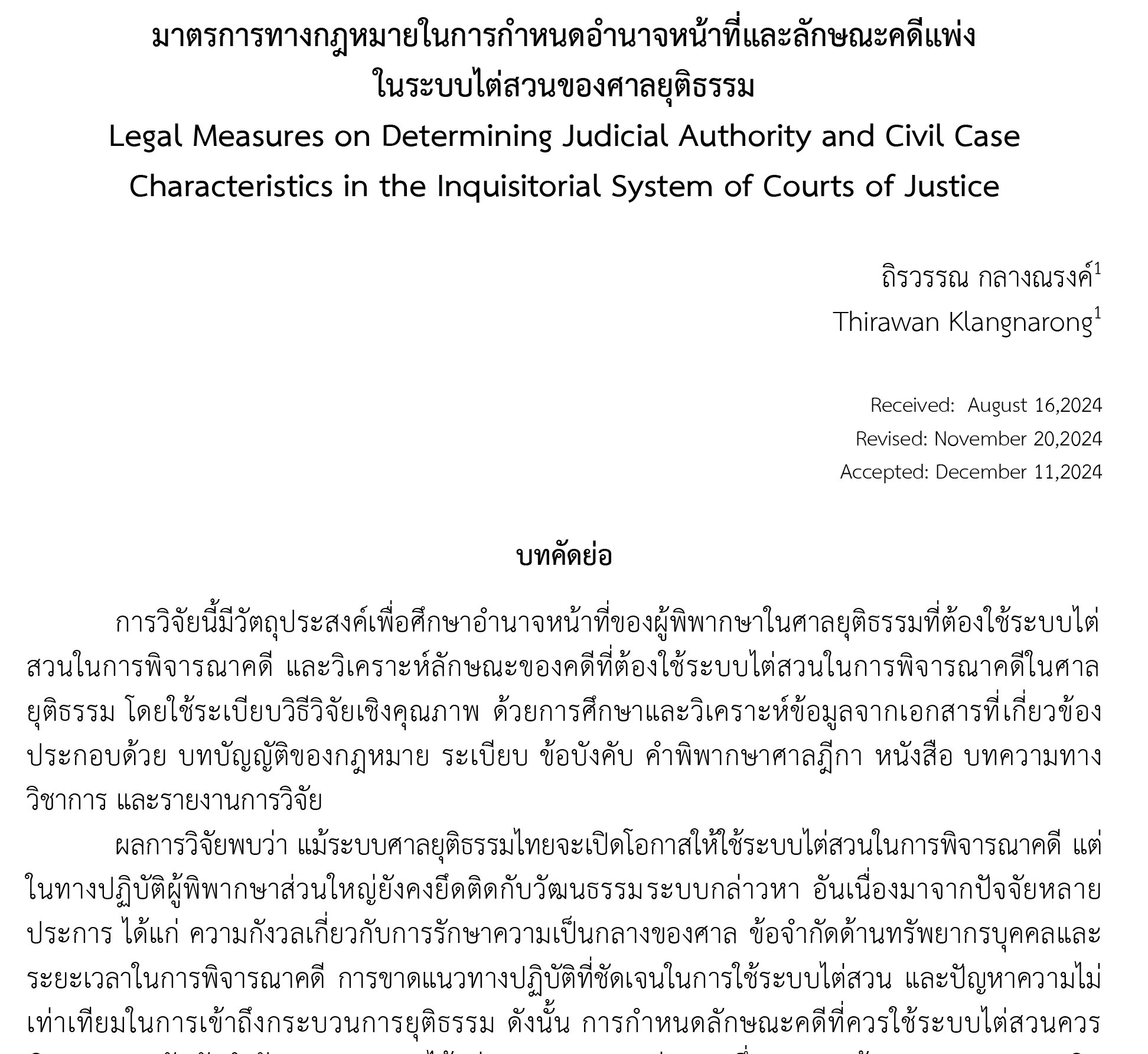Legal Measures on Determining Judicial Authority and Civil Case Characteristics in the Inquisitorial System of Courts of Justice
Keywords:
Inquisitorial System, Judicial Authority, Civil Case ClassificationAbstract
This research aims to study the authority of judges in the judicial system who are required to use the inquisitorial system in trial proceedings. It also seeks to analyze the characteristics of cases suitable for adjudication under the inquisitorial system in the judiciary. The study employs qualitative research methods by examining and analyzing relevant documents, including legal provisions, regulations, judicial decisions from the Supreme Court, books, academic articles, and research reports.
The findings reveal that although the Thai judicial system allows for the use of the inquisitorial system in trial proceedings, in practice, most judges remain attached to the adversarial system culture due to several factors. These include concerns about maintaining judicial impartiality, limitations in human resources and time for case proceedings, the lack of clear guidelines for applying the inquisitorial system, and inequities in access to justice. Therefore, determining the types of cases that should employ the inquisitorial system should consider two key factors (1) The status of the parties, including financial standing, social status, educational background, and bargaining power within the justice process. (2) The nature of the case, encompassing cases involving public interest, technically complex cases requiring specialized expertise. The study recommends integrating the traditional legal culture of the adversarial system with the inquisitorial system to create a new legal culture that aligns with the context of Thai society. This integration aims to enhance the efficiency of justice delivery and build public trust in the judicial process. Additionally, the research suggests improving relevant laws and regulations to provide clarity and alignment with the application of the inquisitorial system, ensuring that trial proceedings are conducted efficiently and transparently.
References
บรรณานุกรมและรายการอ้างอิง
หนังสือ
ชาญชัย แสวงศักดิ์. (2563). กฎหมายมหาชน วิวัฒนาการของกฎหมายมหาชนในต่างประเทศและในประเทศ. (พิมพ์ครั้งที่ 6). กรุงเทพมหานคร: สำนักพิมพ์วิญญูชน.
ธีระ สุธีวรางกุล. (2563). ระบบศาลและการพิจารณาคดีของศาลในทางกฎหมายมหาชน. (พิมพ์ครั้งที่ 2). กรุงเทพมหานคร: โครงการตำราและเอกสารประกอบการสอนคณะนิติศาสตร์. มหาวิทยาลัยธรรมศาสตร์. โรงพิมพ์มหาวิทยาลัยธรรมศาสตร์.
ศนันท์กรณ์ โสตถิพันธุ์. (2562). คำอธิบายหลักพื้นฐานของกฎหมายเอกชน. กรุงเทพมหานคร: สำนักพิมพ์วิญญูชน.
โสภณ รัตนากร. (2565). คำอธิบายกฎหมายลักษณะพยาน. (พิมพ์ครั้งที่ 13). กรุงเทพมหานคร: สำนักพิมพ์วิญญูชน.
ไพโรจน์ วายุภาพ. (2553). คำอธิบายระบบศาลและพระธรรมนูญศาลยุติธรรม. (พิมพ์ครั้งที่ 7) กรุงเทพมหานคร: สำนักพิมพ์วิญญูชน.
ประมวลกฎหมายวิธีพิจารณาความแพ่ง
วารสาร
ธนกฤต วรธนัชชากุล.(2564). ระบบกล่าวหาและระบบไต่สวนกับบทบาทของคู่ความและศาล. ข่าวเนติบัณฑิตยสภา, 34(381), 13-17
วิจัย วิทยานิพนธ์
ศูนย์วิจัยคณะรัฐศาสตร์ มหาวิทยาลัยธรรมศาสตร์. (2546). รวบรวมข้อมูลด้านการเมืองการปกครองของไทย ข้อมูลพื้นฐานเกี่ยวกับสถาบันฝ่ายตุลาการ. สถาบันพระปกเกล้า. กรุงเทพฯ.
ศูนย์บริการวิชาการ สถาบันบัณฑิตพัฒนบริหารศาสตร์. (2556). รายงานวิจัยฉบับสมบูรณ์ การนำระบบไต่สวนมาใช้ในกระบวนการยุติธรรมทางอาญา: ศึกษาเปรียบเทียบนานาประเทศ. สำนักงานอัยการสูงสุด. กรุงเทพฯ.
วีระพงษ์ บุญโญภาส และคณะทำงาน. (2558). การพัฒนาระบบการพิจารณาคดีของศาลยุติธรรมในการค้นหาความจริงเพื่ออำนวยความยุติธรรมแก่ประชาชนตามเจตนารมณ์ของกฎหมาย. คณะนิติศาสตร์ จุฬาลงกรณ์มหาวิทยาลัย. กรุงเทพฯ.
สำนักงานศาลปกครอง. (2563). รายงานวิจัยฉบับสมบูรณ์. โครงการวิจัยระบบไต่สวนกับการพิจารณาพิพากษาคดีของศาลในประเทศไทย: แนวคิดที่มาของต่างประเทศและทิศทางการใช้ในศาลไทย. กรุงเทพฯ.
การประชุมสัมมนาวิชาการ
การพิจารณาคดีแบบระบบไต่สวน หลักการและทางปฏิบัติที่เป็นอยู่ จัดโดยศูนย์กฎหมายมหาชน คณะนิติศาสตร์ มหาวิทยาลัยธรรมศาสตร์ วันจันทร์ที่ 16 มีนาคม 2563 ณ ห้องจี๊ด เศรษฐบุตร คณะนิติศาสตร์ มหาวิทยาลัยธรรมศาสตร์ ท่าพระจันทร์
ปัญหาในการนำการพิจารณาคดีตามระบบไต่สวนมาใช้ในการพิจารณาพิพากษาคดีของศาลไทย จัดโดยสำนักงานศาลปกครอง วันพฤหัสบดีที่ 27 มิถุนายน 2562 ณ ห้องออดิทอเรียม โรงแรมเซ็นทรา บายเซ็นทารา ศูนย์ราชการแจ้งวัฒนะ









